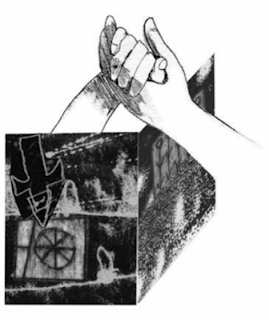Having posted my thoughts yesterday about Joseph Coelho's and Katie Milner's outstanding creation, The Girl Who Became a Tree, I've still had lots of questions buzzing around my head. Some of them might be helpful as a starting point for Book Chat with KS3/4 young people and adults who have read this extraordinary and richly engaging volume.
Happy book-chatting!
The Title
- The title is deliberately prosaic: what effect does it have by referring to the abstract 'girl' and 'tree'?
- Why didn't Joseph Coelho call the book 'Daphne'?
- Does the title engage you to read the story within? How? How not?
The Cover
- What's the difference in your view between a verse-novel and a 'story told in poems'?
- Describe the images on the cover. What feelings does it evoke?
- Talk about the use of colours on the cover. Why has the illustrator/designer used these colours?
The Form
- What kinds of poetic structure are used in 'The Girl Who Became a Tree'?
- How do the different poetic forms affect your reading of the book?
- Can you read the poems as separate texts or do they rely on being part of the whole sequence?
Daphne
- What is ordinary about Daphne? What is extraordinary?
- How does Daphne conquer her anger and anxieties?
- What is the turning point in the story for Daphne?
Mum and Dad
- How do Coelho and Miller represent these two figures in Daphne's life?
- How do you feel about the character of Mum? And Dad? Do your feelings match or echo Daphne's?
Hoc
- What words would you use to describe Hoc?
- What do you notice about Hoc's throne and surroundings? What do they tell us about Hoc? How do they relate to Daphne?
- Hoc is an original creation but who are his 'relatives' from other stories? How are they 'related'?
- Hoc is an unusual word and name, but we do hear it in the Latin phrase 'ad hoc', meaning 'a solution to a given task or problem'. Do you think the phrase is connected to the creature in any way?
- Is Hoc good or bad?
Libraries and librarians
- What role do libraries play in your life? What importance to they have to Daphne? Will the library still have the same role for her after the end of this story?
- What is the importance of having a library as a major part of the story?
- Could the character of the librarian be omitted from the story or not?
The Forest
- What role do forests have in stories? What are some of the most memorable forests you know from real life and from story? What bearing do these have on your reading The Girl who Became a Tree?
- Why is it relevant that Daphne finds herself in a forest?
- Why is it important that Daphne discovers another 'tree' like herself?
The Myth
- Read a traditional version of the myth of Daphne and Apollo. How does Coelho's version of the myth (the parts on black background) retell, build on, and challenge the original myth?
- What is the connection between the myth and Coelho's main story?
- Is The Girl Who Became a Tree an allegory?
Other texts
- Read and talk about the relationship of the following poems and stories to The Girl Who Became a Tree:
- Red Riding Hood
- Philip Larkin - The Trees
- Are there other texts or films which come to your mind while reading? What is the connection?
The Illustrations
- Talk about Katie Milner's style: which words would you use to describe it?
- How does the book benefit from the illustrations?
- Find one picture which you feel strongly connects with the poem it illustrates. How does it achieve this in your view? What does it say about the poem?
- Do the pictures tell their own story as well as illustrate Coelho's?
Out-of-the box thinking...
- Could you read the story backwards, starting with the last poem and working back to the first? How would this structure change/develop your perception of the story?
- If you were to add a poem to the book what would it be about and what form would it take?
- As Daphne's phone is a central part of the story, could you imagine The Girl Who Became a Tree as a phone app or game? How would it translate to this medium?
- If you were making a film of this book, how would you represent Hoc? How would you show Daphne's transformation? How would the original myth be part of the film?
You may find it of interest to listen to the fascinating interview between Joseph Coelho and Nikki Gamble on the following podcast: https://justimagine.co.uk/podcast/joseph-coelho/
The Girl Who Became a Tree is published by Otter-Barry Books. With thanks to Nicky Potter who provided Kate Milner's illustrations for use in this blog.


No comments:
Post a Comment